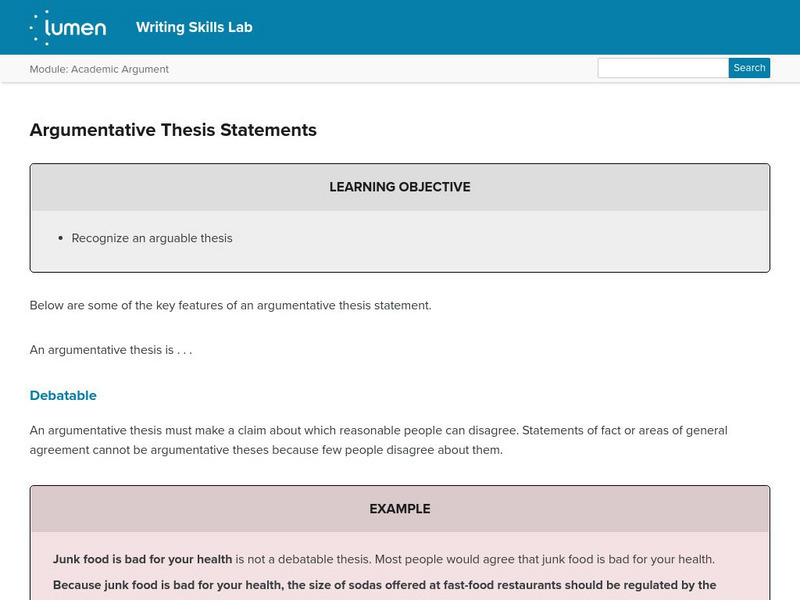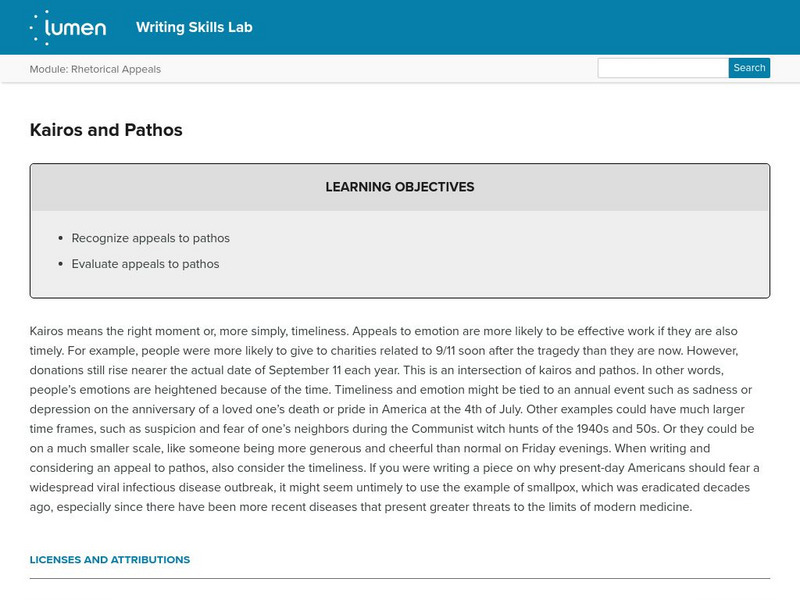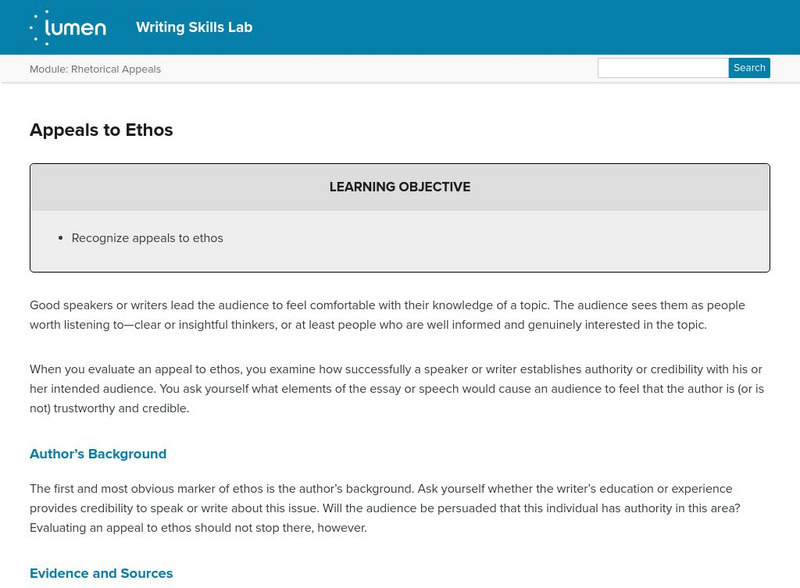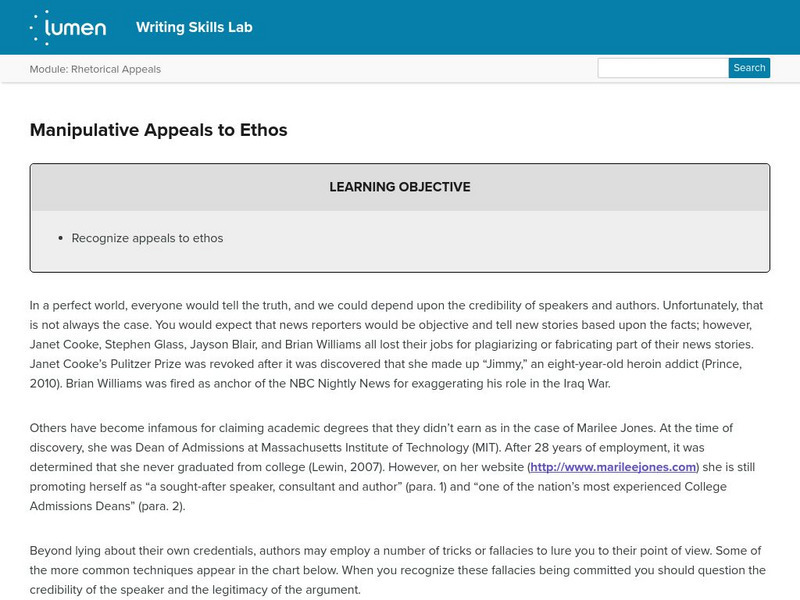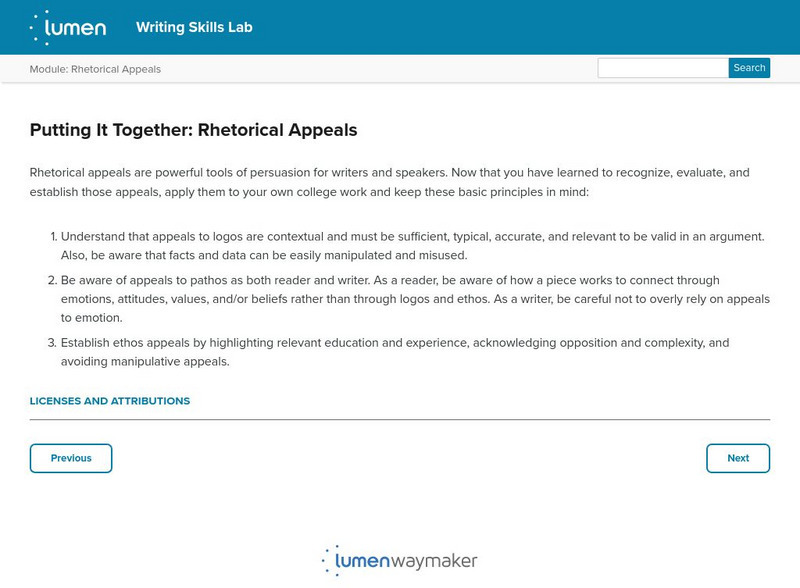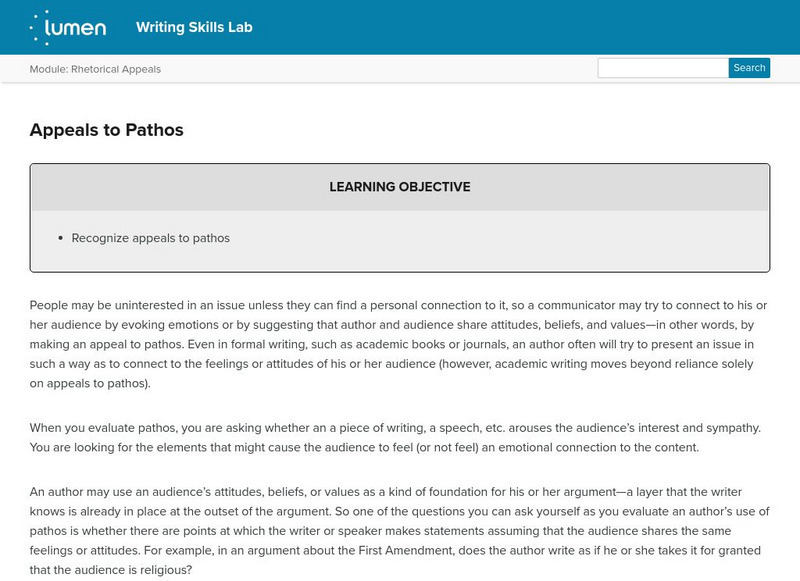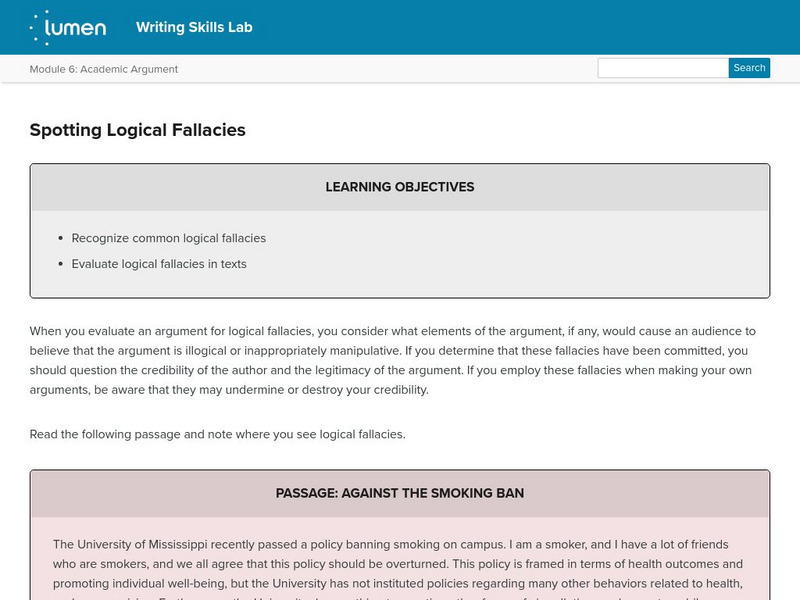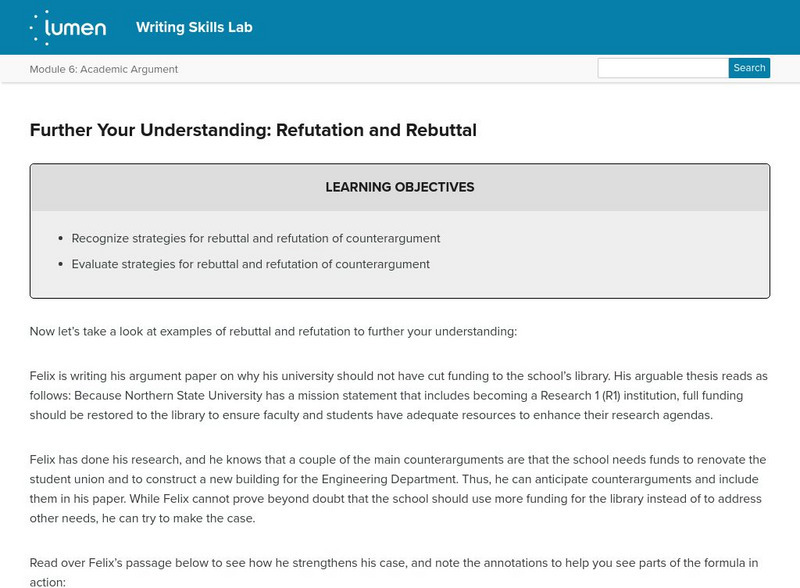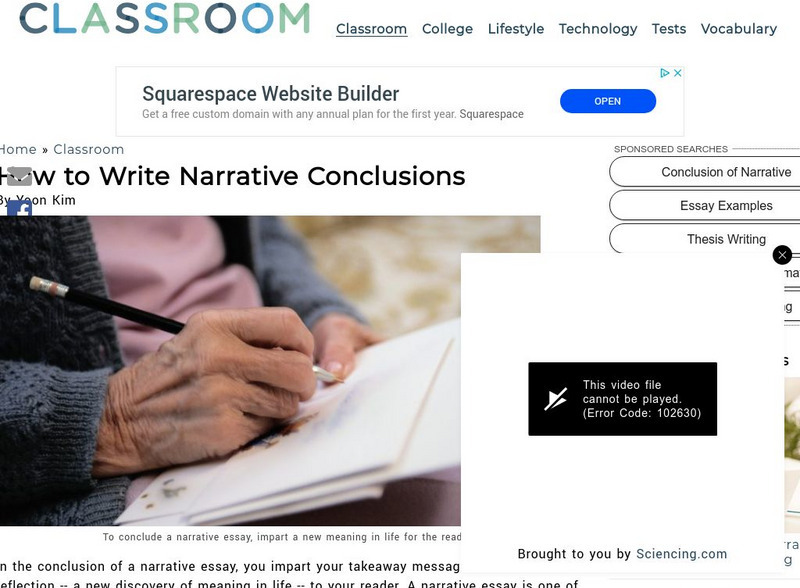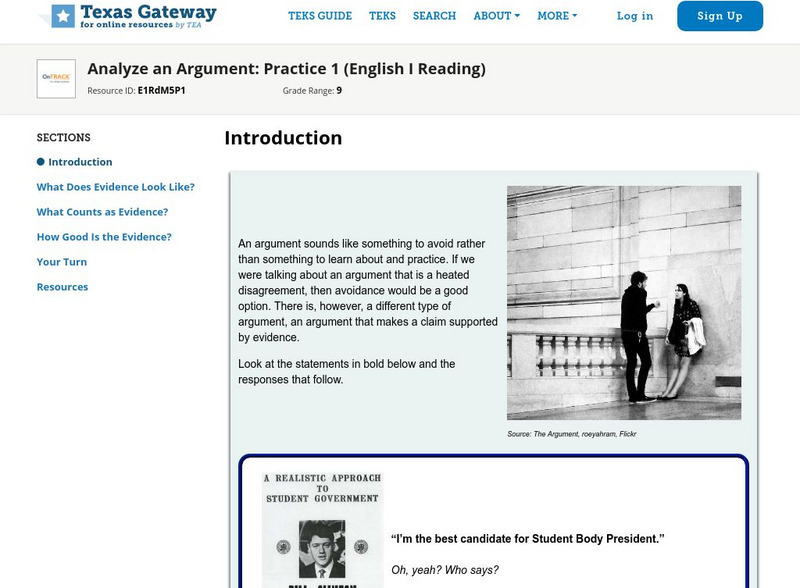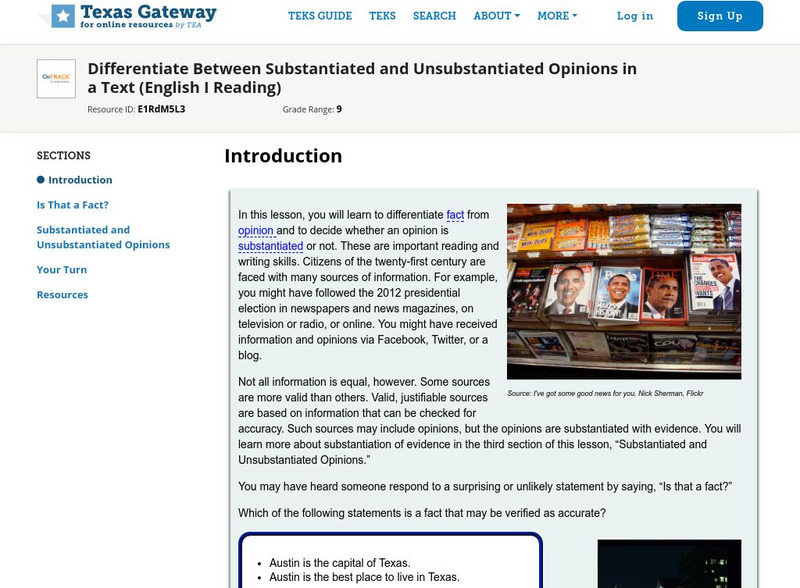Lumen Learning
Lumen: Rhetorical Appeals: Manipulative Appeals to Logos
This instructional activity focuses on how to determine if an appeal to logos is manipulative. It also provides a practice activity.
Lumen Learning
Lumen: Rhetorical Appeals: Kairos and Logos
This lesson focuses on the 4th logical appeal called Kairos, a time when conditions are right for the accomplishment of a crucial action; the opportune and decisive moment.
Lumen Learning
Lumen: Academic Argument: Argumentative Thesis Statements
This instructional activity focuses on argumentative thesis statements and on recognizing an arguable thesis.
Lumen Learning
Lumen: Rhetorical Appeals: Kairos and Pathos
This instructional activity focuses on appeals that use both Kairos and Pathos, appeals to emotion (pathos) are more likely to be effective work if they are also timely (kairos).
Lumen Learning
Lumen: Rhetorical Appeals: Appeals to Ethos
This lesson focuses on appeals to Ethos, When you evaluate an appeal to ethos, how successfully a speaker or writer establishes authority or credibility with his or her intended audience. You ask yourself what elements of the essay or...
Lumen Learning
Lumen: Rhetorical Appeals: Manipulative Appeals to Ethos
This lesson focuses on the ways appeals to ethos can be manipulative including lying about their credentials and employing a number of tricks or fallacies to lure you to their point of view.
Lumen Learning
Lumen: Rhetorical Appeals: Establishing Ethos
This lesson focuses on establishing ethos or credibility. You can establish ethos-or credibility-in two basic ways: you can use or build your own credibility on a topic, or you can use credible sources, which, in turn, builds your...
Lumen Learning
Lumen: Putting It Together: Rhetorical Appeals
This lesson brings together the rhetorical appeals including Logos, Pathos, and Ethos and how to identify and apply each. Click the Next link for more information.
Lumen Learning
Lumen: Analysis: Suspend Judgment
This article focuses on the need to suspend judgment and keep an open mind while analyzing a situation or researching a topic.
Lumen Learning
Lumen: Analysis: Evidence
This lesson focuses on evidence in the analysis including being selective with evidence, being clear and explicit, and moving past obvious interpretations.
Lumen Learning
Lumen: Rhetorical Appeals: Appeals to Pathos
This lesson focuses on appeals to pathos; to connect to the audience by evoking emotions or by suggesting that author and audience share attitudes, beliefs, and values.
Lumen Learning
Lumen: Rhetorical Appeals: Manipulative Appeals to Pathos
This lesson focuses on the manipulative appeals to pathos, trying to unfairly play upon the audience's feelings and emotions through fallacious, misleading, or excessively emotional appeals.
Lumen Learning
Lumen: Writing Skills: Common Logical Fallacies
This lesson focuses on logical fallacies including defining them, discussing the different types of logical fallacies, and a practice activity.
Lumen Learning
Lumen: Writing Skills: Spotting Logical Fallacies
This instructional activity focuses on recognizing common logical fallacies and evaluating them in texts. It also provides a practice exercise.
Lumen Learning
Lumen: Writing Skills: Formula for Refutation and Rebuttal
This lesson focuses on the formula for refuting and rebutting counterarguments including accurately representing opposing viewpoints, using a respectful, non-incendiary tone, using reliable information, using qualifying words to aid...
Lumen Learning
Lumen: Writing Skills: Further Your Understanding: Refutation and Rebuttal
This lesson focuses on examples of rebuttal and refutation to improve your understanding.
Lumen Learning
Lumen: Critical Reading: Logic and Structure
This lesson focuses on structure and logic including types and purposes of essays, organizational patterns, argumentative writing, and logic and fallacies.
University of Victoria (Canada)
Uvcs: Critical Reading Exercise
Students read quotations from different "interest groups" or "lobbies" in this exercise and then perform a multiple-choice test to evaluate the credibility of each lobby group.
Texas Education Agency
Texas Gateway: Informational Text: Analyze an Argument: Practice 1
When you read an argumentative essay or article, you should analyze the author's evidence. However, you can't analyze the evidence a writer gives in support of a position if you don't know the author's perspective.
Leaf Group
Classroom: How to Write Narrative Conclusions
This article focuses on how to write conclusions for narratives by sharing a takeaway message, a lesson or a reflection -- a new discovery of meaning in life -- for your reader. W.9-10.3e Conclusion, W.11-12.3e Narrative Conclusion
Texas Education Agency
Texas Gateway: Analyze Literary Essays' Inclusion of Personal Opinions and Facts
In this lesson, you will learn how to identify and discuss the use of facts, personal examples, and ideas and how they are woven into a literary essay.
Texas Education Agency
Texas Gateway: Analyze an Argument: Practice 1 (English I Reading)
In this lesson, you are going to practice analyzing the evidence that supports or opposes an argument. You are also going to learn to analyze the quality, relevance, and credibility of the evidence so you can decide whether to accept the...
Texas Education Agency
Texas Gateway: Differentiate Between Substantiated and Unsubstantiated Opinions
[Accessible by TX Educators. Free Registration/Login Required] In this lesson, you will learn to differentiate fact from opinion and to decide whether an opinion is substantiated or not. These are important reading and writing skills.
Other
Csicop: Field Guide to Critical Thinking
This article, originally published in Skeptical Inquirer, outlines some of the key components of the scientific problem-solving process while addressing the many reasons for the popularity of paranormal beliefs in the U.S. (Published in...


